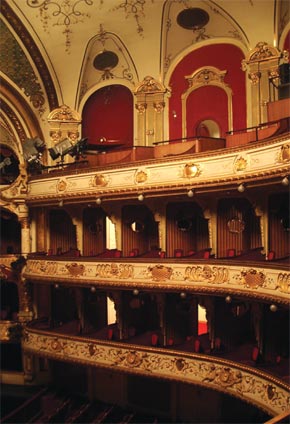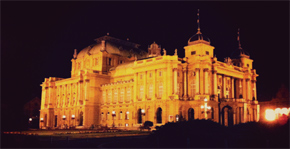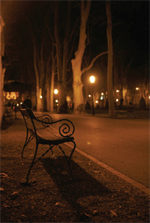
Music soothes the soul they say – but it also excites, infuriates, stimulates, or sedates, depending on the tempo. Music is cross-cultural – independent of nationality. One can appreciate the rhythmic view of a composer’s effort completely, without words. Lyrics add to the enjoyment, but the notes must stand on their own.
Looking back to our two enjoyable weeks spent in Yugoslavia many years ago causes me great distress. Then the country appeared so united and filled with potential. The hard and difficult years of World War II and the structured restricted years under Marshal Tito were past. The Olympics held at Sarajevo had highlighted the beauties and delights of this wonderful country, and the future looked bright indeed. Then came the nasty conflict between the Croatians and the Serbians, and all the delight seemed to fade. I hear it is recovering slowly, but I have not seen it first-hand. My memory takes me back to the peaceful times.
Another couple had joined us in Dubrovnik. This ancient city on the Adriatic Sea with a harbor thousands of years old had put us in a mood to experience this vastly diversified country. We had visited other areas of Croatia and were now camped in the InterContinental Hotel near downtown Zagreb. Zagreb was then a prominent city in this united nation and was composed of a number of fascinating sights. We walked a great deal, enjoyed the culinary delights of the marketplace, took the funicular to the upper part of town, and wandered through St. Stephen’s Church.
 As we were on our way back to the hotel we spied the ornate and stately Zagreb Opera House set on a slight rise overlooking the lower portion of the city. It was a magnet we could not resist. We walked around the building admiring the architecture and the decorative yellow façade and soon found the front door.
As we were on our way back to the hotel we spied the ornate and stately Zagreb Opera House set on a slight rise overlooking the lower portion of the city. It was a magnet we could not resist. We walked around the building admiring the architecture and the decorative yellow façade and soon found the front door.
Apparently there was a performance that evening and the ticket office was open, so we tried. “All sold out,” we were informed. “People from all over Europe come to visit our wonderful productions,” he told us with great pride. As we talked to the ticket seller my companion began folding and refolding a significantly-sized American bill. We explained to the agent that we were in town for just a night or two and perhaps he knew a way to get us seats at the opera. The agent’s eyes became transfixed on the greenback, and, as though hypnotized by it, his memory improved. He remembered a box with four seats and thought perhaps the owners were away, and it might just become available. The negotiations continued. Not any box, but a prime set of seats for the four of us in a choice location. The dialog ended with the agreement that we were to arrive at the ticket counter that evening ten to fifteen minutes prior to the eight o’clock p.m. start and search for him – only him. He would have the desired seats available in exchange for that well-folded American currency. We did just that.
 The ushers, upon seeing the tickets, led us to the mezzanine, parted a set of plush, red velvet curtains, and showed us our seats in the elegant, if somewhat worn, mezzanine box. It was in the exact center of the main portion of the Opera House. Several hundred seats on the main floor lay below us, and the exceptionally steep balcony formed the roof of our box. Both to the left and right sides of our central box appeared similar enclosures. Placed in each of these boxes were four comfortable armchairs with a cocktail table properly positioned to receive refreshments. The furniture was elegant and delightful in an old-world way – slightly frayed but certainly hinting at past opulence. The house lights dimmed and in all its majestic glory, the performance began. We were swept up in the overture and the romance of this historic environment. The music itself was very familiar to us all, but the only recognizable words were “cigarillo” and “toreador.” Yes, it was Carmen in all her sultry finest with music by Bizet and the words, of course – the words were in Serbo-Croatian.
The ushers, upon seeing the tickets, led us to the mezzanine, parted a set of plush, red velvet curtains, and showed us our seats in the elegant, if somewhat worn, mezzanine box. It was in the exact center of the main portion of the Opera House. Several hundred seats on the main floor lay below us, and the exceptionally steep balcony formed the roof of our box. Both to the left and right sides of our central box appeared similar enclosures. Placed in each of these boxes were four comfortable armchairs with a cocktail table properly positioned to receive refreshments. The furniture was elegant and delightful in an old-world way – slightly frayed but certainly hinting at past opulence. The house lights dimmed and in all its majestic glory, the performance began. We were swept up in the overture and the romance of this historic environment. The music itself was very familiar to us all, but the only recognizable words were “cigarillo” and “toreador.” Yes, it was Carmen in all her sultry finest with music by Bizet and the words, of course – the words were in Serbo-Croatian.
 I have listened to Carmen many times since, both at home in my living room and at well-staged performances. But each time my thoughts and sadness go back to that wonderful night, and I smile to myself wondering how many people in this world have enjoyed the tale of this gypsy seductress and her soldier hero – in Serbo-Croatian.
I have listened to Carmen many times since, both at home in my living room and at well-staged performances. But each time my thoughts and sadness go back to that wonderful night, and I smile to myself wondering how many people in this world have enjoyed the tale of this gypsy seductress and her soldier hero – in Serbo-Croatian.
Harry Hubinger is a retired engineer who operated his own company for twenty years. He first began traveling outside the United States on business, but these visits escalated upon his retirement. He has now traveled to 115 countries and continues to add several new ones each year. In 1998 he began writing his humorous and insightful articles for a supplement to a local newspaper. These stories, based on experiences most travelers could identify with, soon earned him a wide local following. In 2005 he published his first book, Stamps in My Passport—a collection of travel vignettes. Harry has lived in Danville for almost forty years and has volunteered with the Danville Police Department for the past seven. His wife, Barbara, is the detail chronicler of their trips. Her journals provide the background for Harry’s broader view. You can get his book at: www.travelbookspub.com.
Leave a Reply